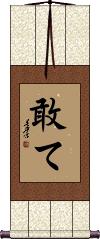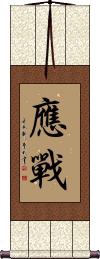Many custom options...
And formats...

Challenge in Chinese / Japanese...
Buy a Challenge calligraphy wall scroll here!
Personalize your custom “Challenge” project by clicking the button next to your favorite “Challenge” title below...
Take Up a Challenge
敢て is a Japanese word that can mean a few things related to the idea of taking up a challenge.
It can be defined as daring (to do something), venturing (often overcoming reluctance), or taking action (even in the face of probable failure). It can also be to take upon oneself or take up a challenge.
Take Up a Challenge
應戰 is a Chinese word that means “to take up a challenge” or “to face an attack and meet it.”
Undaunted After Repeated Setbacks
Persistence to overcome all challenges
百折不撓 is a Chinese proverb that means “Be undaunted in the face of repeated setbacks.”
More directly translated, it reads, “[Overcome] a hundred setbacks, without flinching.” 百折不撓 is of Chinese origin but is commonly used in Japanese and somewhat in Korean (same characters, different pronunciation).
This proverb comes from a long, and occasionally tragic story of a man that lived sometime around 25-220 AD. His name was Qiao Xuan, and he never stooped to flattery but remained an upright person at all times. He fought to expose the corruption of higher-level government officials at great risk to himself.
Then when he was at a higher level in the Imperial Court, bandits were regularly capturing hostages and demanding ransoms. But when his own son was captured, he was so focused on his duty to the Emperor and the common good that he sent a platoon of soldiers to raid the bandits' hideout, and stop them once and for all even at the risk of his own son's life. While all of the bandits were arrested in the raid, they killed Qiao Xuan's son at first sight of the raiding soldiers.
Near the end of his career, a new Emperor came to power, and Qiao Xuan reported to him that one of his ministers was bullying the people and extorting money from them. The new Emperor refused to listen to Qiao Xuan and even promoted the corrupt Minister. Qiao Xuan was so disgusted that in protest, he resigned from his post as minister (something almost never done) and left for his home village.
His tombstone reads “Bai Zhe Bu Nao” which is now a proverb used in Chinese culture to describe a person of strong will who puts up stubborn resistance against great odds.
My Chinese-English dictionary defines these 4 characters as “keep on fighting despite all setbacks,” “be undaunted by repeated setbacks,” and “be indomitable.”
Our translator says it can mean “never give up” in modern Chinese.
Although the first two characters are translated correctly as “repeated setbacks,” the literal meaning is “100 setbacks” or “a rope that breaks 100 times.” The last two characters can mean “do not yield” or “do not give up.”
Most Chinese, Japanese, and Korean people will not take this absolutely literal meaning but will instead understand it as the title suggests above. If you want a single big word definition, it would be indefatigability, indomitableness, persistence, or unyielding.
See Also: Tenacity | Fortitude | Strength | Perseverance | Persistence
Not the results for challenge that you were looking for?
Below are some entries from our dictionary that may match your challenge search...
| Characters If shown, 2nd row is Simp. Chinese |
Pronunciation Romanization |
Simple Dictionary Definition |
將軍 将军 see styles |
jiāng jun jiang1 jun1 chiang chün |
More info & calligraphy: Chinese or Korean Army General |
應戰 应战 see styles |
yìng zhàn ying4 zhan4 ying chan |
More info & calligraphy: Take Up a Challenge |
搦 see styles |
nuò nuo4 no karami からみ |
(literary) to hold (in the hand); to challenge; to provoke (place-name) Karami |
PK see styles |
p k p k p k pii kee; piikee(sk); piikei(sk) / pi kee; pikee(sk); pike(sk) ピー・ケー; ピーケー(sk); ピーケイ(sk) |
(slang) to take on; to challenge; to go head to head; showdown; comparison (1) (abbreviation) {sports} (See ペナルティーキック) penalty kick; (2) (abbreviation) (See サイコキネシス) psychokinesis; (3) (abbreviation) (See パルクール) parkour |
仕掛 see styles |
shikake しかけ |
(1) device; contrivance; mechanism; gadget; (2) trick; trap; calculated manipulation; gambit; (3) (small) scale; half finished; (4) commencement; initiation; (5) set up; laying out; preparation; (6) challenge; attack |
動搖 动摇 see styles |
dòng yáo dong4 yao2 tung yao dōyō |
to sway; to waver; to rock; to rattle; to destabilize; to pose a challenge to tremble |
叫板 see styles |
jiào bǎn jiao4 ban3 chiao pan |
to signal the musicians (in Chinese opera, by prolonging a spoken word before attacking a song); (coll.) to challenge |
叫陣 叫阵 see styles |
jiào zhèn jiao4 zhen4 chiao chen |
to challenge an opponent to a fight |
命題 命题 see styles |
mìng tí ming4 ti2 ming t`i ming ti meidai / medai めいだい |
proposition (logic, math.); to assign an essay topic (noun - becomes adjective with の) (1) proposition; thesis; notion; theory; (noun - becomes adjective with の) (2) problem; issue; challenge thesis |
忌避 see styles |
jì bì ji4 bi4 chi pi kihi きひ |
(n,vs,vt,vi) (1) evasion; avoidance; shirking; (n,vs,vt,vi) (2) {law} recusation (of a judge); taking exception (to a judge); challenge to avoid |
応戦 see styles |
ousen / osen おうせん |
(n,vs,vi) fighting back; returning fire; counter-attack; responding to an attack; accepting a challenge |
戰書 战书 see styles |
zhàn shū zhan4 shu1 chan shu |
written war challenge |
挑む see styles |
idomu いどむ |
(transitive verb) (1) to challenge to (a fight, game, etc.); to throw down the gauntlet; to contend for; (v5m,vi) (2) to tackle (e.g. a problem); to attempt; to go after (a prize, record, etc.); (v5m,vi) (3) to pressure (someone) for sex; to make advances to |
挑戦 see styles |
chousen / chosen ちょうせん |
(n,vs,vi) challenge; defiance; dare; attempt; try |
挑戰 挑战 see styles |
tiǎo zhàn tiao3 zhan4 t`iao chan tiao chan |
to challenge; challenge |
搦戰 搦战 see styles |
nuò zhàn nuo4 zhan4 no chan |
to challenge to battle |
申込 see styles |
moushikomi / moshikomi もうしこみ |
application; entry; request; subscription; offer; proposal; overture; challenge |
硬仗 see styles |
yìng zhàng ying4 zhang4 ying chang |
tough battle; difficult task; big challenge |
童趣 see styles |
tóng qù tong2 qu4 t`ung ch`ü tung chü |
qualities that delight children (e.g. bold colors in a picture, anthropomorphized characters in a TV show, the physical challenge of playground equipment) |
肉迫 see styles |
nikuhaku にくはく |
(noun/participle) come close to; closing in upon; pressing hard (on the enemy); challenge |
臨み see styles |
nozomi のぞみ |
challenge; confrontation |
課題 课题 see styles |
kè tí ke4 ti2 k`o t`i ko ti kadai かだい |
task; problem; issue (1) subject; theme; issue; matter; (2) homework; assignment; (3) problem (that needs solving); task; challenge; question |
踢館 踢馆 see styles |
tī guǎn ti1 guan3 t`i kuan ti kuan |
to challenge an established martial arts school to a fight (to prove one's skills or gain reputation); (fig.) to prove oneself by competing against those already established in a particular field |
難題 难题 see styles |
nán tí nan2 ti2 nan t`i nan ti nandai なんだい |
difficult problem difficult problem; challenge |
ウケる see styles |
ukeru ウケる |
(transitive verb) (1) to receive; to get; (2) to catch (e.g. a ball); (3) to be struck by (wind, waves, sunlight, etc.); (4) to sustain (damage); to incur (a loss); to suffer (an injury); to feel (influence); (5) to undergo (e.g. surgery); to take (a test); to accept (a challenge); (6) to be given (e.g. life, talent); (7) to follow; to succeed; to be descended from; (8) to face (south, etc.); (9) (linguistics terminology) to be modified by; (10) to obtain (a pawned item, etc.) by paying a fee; (v1,vi) (11) (kana only) to be well-received; to become popular; to go down well; (12) (colloquialism) (kana only) to be funny; to be humorous |
享ける see styles |
ukeru うける |
(transitive verb) (1) to receive; to get; (2) to catch (e.g. a ball); (3) to be struck by (wind, waves, sunlight, etc.); (4) to sustain (damage); to incur (a loss); to suffer (an injury); to feel (influence); (5) to undergo (e.g. surgery); to take (a test); to accept (a challenge); (6) to be given (e.g. life, talent); (7) to follow; to succeed; to be descended from; (8) to face (south, etc.); (9) (linguistics terminology) to be modified by; (10) to obtain (a pawned item, etc.) by paying a fee; (v1,vi) (11) (kana only) to be well-received; to become popular; to go down well; (12) (colloquialism) (kana only) to be funny; to be humorous |
仕掛け see styles |
shikake しかけ |
(1) device; contrivance; mechanism; gadget; (2) trick; trap; calculated manipulation; gambit; (3) (small) scale; half finished; (4) commencement; initiation; (5) set up; laying out; preparation; (6) challenge; attack |
初挑戦 see styles |
hatsuchousen / hatsuchosen はつちょうせん |
first challenge; first try |
受ける see styles |
ukeru うける |
(transitive verb) (1) to receive; to get; (2) to catch (e.g. a ball); (3) to be struck by (wind, waves, sunlight, etc.); (4) to sustain (damage); to incur (a loss); to suffer (an injury); to feel (influence); (5) to undergo (e.g. surgery); to take (a test); to accept (a challenge); (6) to be given (e.g. life, talent); (7) to follow; to succeed; to be descended from; (8) to face (south, etc.); (9) (linguistics terminology) to be modified by; (10) to obtain (a pawned item, etc.) by paying a fee; (v1,vi) (11) (kana only) to be well-received; to become popular; to go down well; (12) (colloquialism) (kana only) to be funny; to be humorous |
咎める see styles |
togameru とがめる |
(transitive verb) (1) to blame; to reproach; to censure; to rebuke; to reprove; to find fault; to take to task; to criticize; to criticise; (transitive verb) (2) to question (a suspect); to challenge; (Ichidan verb) (3) to aggravate (an injury); to be aggravated; to get inflamed; (v1,vi) (4) (See 気が咎める) to prick (one's conscience) |
Click here for more challenge results from our dictionary
The following table may be helpful for those studying Chinese or Japanese...
| Title | Characters | Romaji (Romanized Japanese) | Various forms of Romanized Chinese | |
| Take Up a Challenge | 敢て | aete | ||
| Take Up a Challenge | 應戰 应战 | yìng zhàn ying4 zhan4 ying zhan yingzhan | ying chan yingchan |
|
| Undaunted After Repeated Setbacks | 百折不撓 百折不挠 | hyaku setsu su tou hyakusetsusutou hyaku setsu su to | bǎi zhé bù náo bai3 zhe2 bu4 nao2 bai zhe bu nao baizhebunao | pai che pu nao paichepunao |
| In some entries above you will see that characters have different versions above and below a line. In these cases, the characters above the line are Traditional Chinese, while the ones below are Simplified Chinese. | ||||
Successful Chinese Character and Japanese Kanji calligraphy searches within the last few hours...






